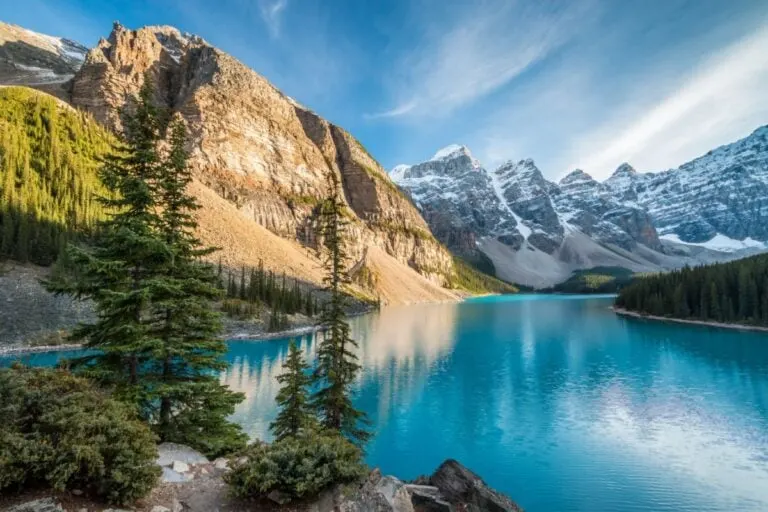Train travel is having a moment.
Both domestically and overseas, more travelers than ever are choosing to slow down and take the train to explore new destinations.
One of the things I love most about travel travel is that it allows you to see a new destination from a unique perspective.
You just can’t immerse yourself in a destination in the same way if you fly into a hotspot and then follow the tourist throng to the nearest beach!
So, which train routes stand out from the crowd?
According to Conde Nast Travel, the Rocky Mountain Railway is the best train route in North America. Here’s why.
Why Is The Rocky Mountain Railway Considered Iconic?
The views on this train route are epic.
You get to experience all the majesty of the Rocky Mountains from the comfort of a luxury train seat and from a very unique perspective.
Fall foliage and snow-topped peaks look better than ever on this train route, which only operates from sunrise to sunset.
This ensures that passengers don’t miss any of the outstanding scenery while it’s too dark to appreciate it.

Some of the sights you will see on this railway route are Mount Robson, which is the highest peak in the Canadian Rockies, and the truly breathtaking Pyramid Falls waterfalls.
This route is considered to have the highlights of mountainous highs, canyon lows, icy rivers, lush forests, and everything in between.
If you take the First Passage To The West route, you can also explore Lake Louise.
This train ride has become one of the most iconic attractions in Canada, and it feels like it’s a historic attraction.
So I was surprised to learn that the Rocky Mountaineer train was only founded in 1990.

Despite this, the train does have a rich history that will appeal to culture vultures.
It is the only passenger train that travels on the oldest section of the Canadian Pacific Railway, which connects Vancouver to Banff.
This historically significant railway track was constructed in the 19th century.
Exploring The Rocky Mountaineer Train
The best attractions of the Rocky Mountaineer are the truly awe-inspiring views.
And the rail company knows it!
So, to make sure you don’t miss a thing, the carriages of the train have huge glass dome windows on both sides.

I love train travel, but this sounds more opulent than any train I have ever experienced.
This isn’t an ordinary train: it is designed to offer ultimate luxury and comfort.
There are 2 carriage classes available: Silver Leaf and Gold Leaf. Both offer breakfast, lunch and complimentary drinks and snacks.
But with Silver Leaf class these are served at your seat, and with Gold Leaf class you have an exclusive dining room.
Similarly both classes offer an outdoor viewing space. But this is a larger platform if you opt for Gold Leaf class tickets.

The Rocky Mountaineer can take one of 4 different routes, with each showcasing the Rocky Mountains from a unique perspective.
Wondering how much it will cost?
I’m not going to lie and suggest that this is a low-cost route for budget travelers, but it is an epic bucket list experience that’s still worth considering.
The price of a 2 day rail journey from Vancouver to Banff, in Silver Leaf class would cost $1,364. If you prefer to travel in Gold Leaf class then the price increases to $1,810.

This includes breakfast, lunch, drinks and snacks, luggage handling and rail station transfers, and a night’s hotel stay in Kamloops.
The Routes Available
As you would expect, the longer your journey, the more expensive your package will be.
The Rocky Mountaineer offers four different routes with durations ranging from 2 days to 7 days.
The routes you can choose from are:

- First Passage to the West: Vancouver – Kamloops – Banff / Lake Louise
- Journey Through the Clouds: Vancouver – Kamloops – Jasper
- Rain Forest to Gold Rush: Vancouver – Whistler – Quesnel – Jasper
- Rockies to the Red Rocks: Moab – Glenwood Springs – Denver
Technically, there are 8 options available to you, as each of these 4 routes can also be taken in reverse!
This means that if it’s more convenient for you to start from either direction, that option is available to you.
Credit: Source link

